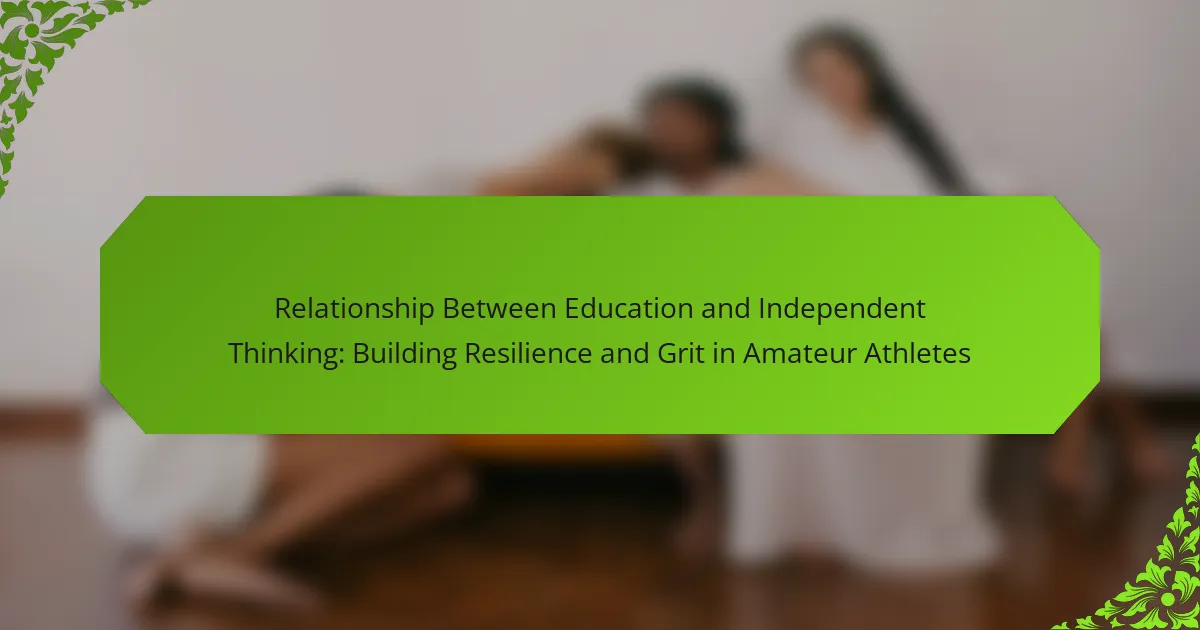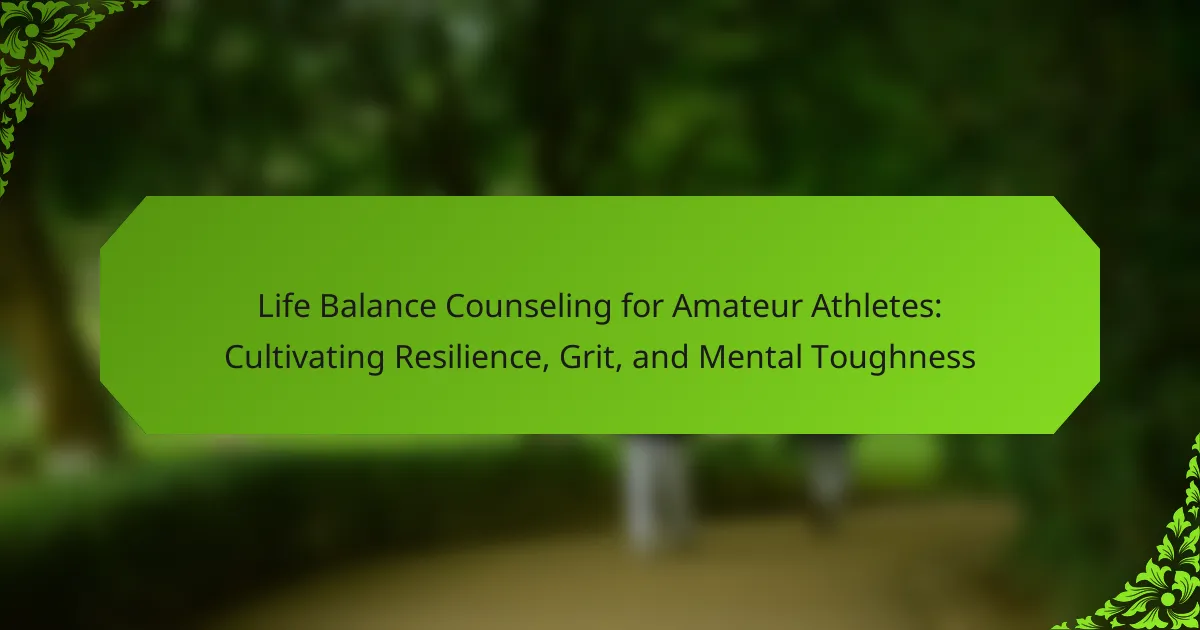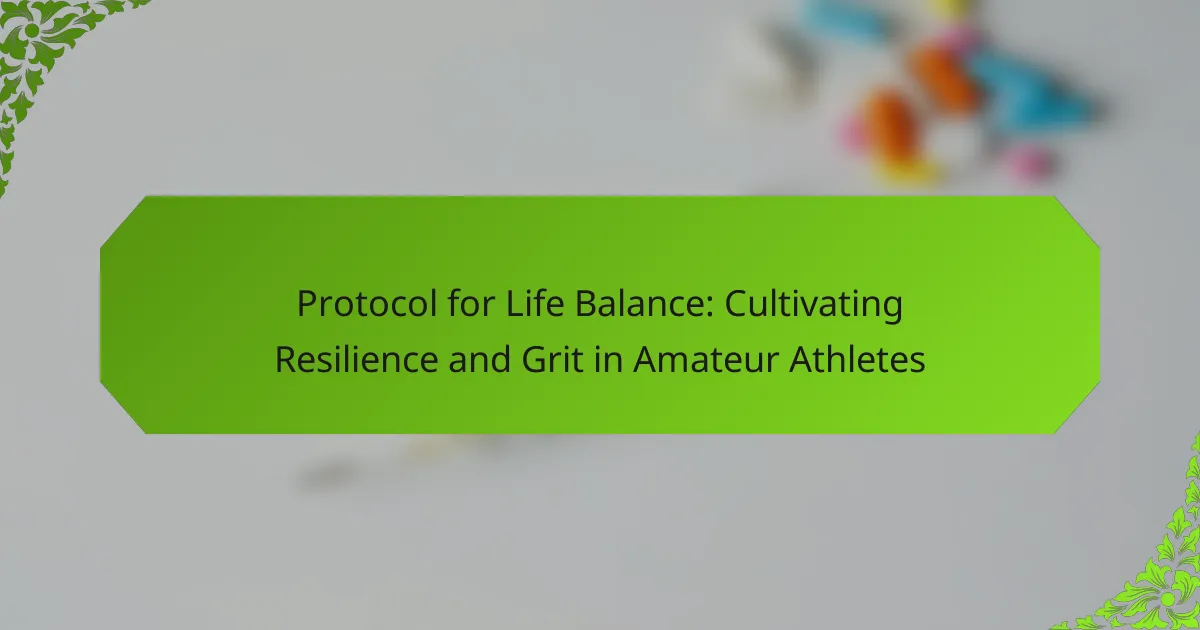Education is essential for amateur athletes aiming for success. It develops resilience and grit, enhances problem-solving and adaptability, and fosters teamwork and communication skills. Educational experiences teach discipline and time management, helping athletes balance training and academics. Local resources provide tailored support, creating a community that reinforces these skills and motivates athletes to overcome challenges.
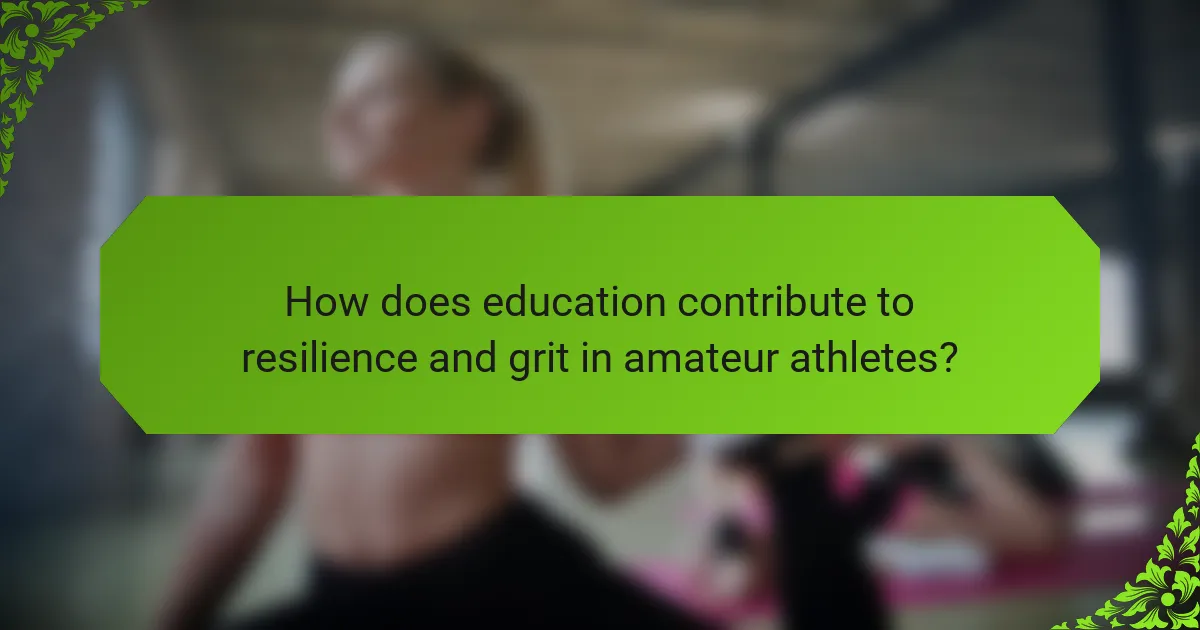
How does education contribute to resilience and grit in amateur athletes?
Education fosters resilience and grit in amateur athletes by equipping them with essential skills and a growth mindset. It encourages problem-solving, adaptability, and perseverance, which are crucial for overcoming challenges in sports.
Research indicates that athletes who engage in educational programs develop better coping strategies. These strategies help them manage stress and setbacks, enhancing their overall performance. Education also promotes teamwork and communication skills, vital for success in competitive environments.
Furthermore, educational experiences can instill a sense of discipline and time management. Athletes learn to balance training with academic responsibilities, reinforcing their commitment and focus. This dual engagement cultivates a robust work ethic, essential for achieving long-term goals in athletics.
In summary, education not only contributes to the technical skills of amateur athletes but also shapes their mental fortitude, making them more resilient and gritty in the face of adversity.
What are the key components of resilience and grit?
Resilience and grit are crucial for amateur athletes to succeed. Key components include perseverance, adaptability, and a strong sense of purpose. Perseverance enables athletes to push through challenges, while adaptability allows them to adjust to new circumstances. A strong sense of purpose motivates them to pursue their goals despite setbacks. Together, these components foster a mindset essential for overcoming obstacles in sports and life.
Why is resilience important for amateur athletes?
Resilience is crucial for amateur athletes as it enhances their ability to overcome challenges and setbacks. Building resilience fosters mental toughness, allowing athletes to maintain focus and motivation despite obstacles. Research shows that resilient athletes are more likely to achieve their goals, as they adapt to stress and recover from failures more effectively. This characteristic not only improves performance but also contributes to personal growth and lifelong skills.
What role does mental toughness play in athletic performance?
Mental toughness significantly enhances athletic performance by fostering resilience and grit. This psychological attribute enables athletes to maintain focus, cope with pressure, and recover from setbacks. Research shows that mentally tough athletes exhibit improved consistency and motivation, leading to better results in competitions. Developing mental toughness involves training techniques such as visualization, goal setting, and positive self-talk, which are crucial for amateur athletes seeking to elevate their performance.
How does emotional regulation enhance resilience?
Emotional regulation significantly enhances resilience by enabling individuals to manage stress and recover from setbacks effectively. It allows amateur athletes to maintain focus and motivation despite challenges. Research indicates that athletes with strong emotional regulation skills exhibit higher levels of grit, which correlates with improved performance and persistence. Furthermore, emotional regulation fosters a positive mindset, essential for overcoming obstacles in sports. This ability to adapt emotionally not only supports athletic success but also contributes to overall well-being and personal development.
What unique educational strategies foster resilience and grit?
Unique educational strategies that foster resilience and grit include experiential learning, goal-setting, and fostering a growth mindset. Experiential learning allows amateur athletes to face challenges directly, enhancing their problem-solving skills. Goal-setting provides clear benchmarks, motivating athletes to persevere through setbacks. Fostering a growth mindset encourages athletes to view failures as opportunities for growth, reinforcing their resilience. These strategies collectively build a strong foundation for success in sports and life.
How can goal-setting techniques improve grit?
Goal-setting techniques enhance grit by providing clear objectives and measurable milestones. This clarity fosters persistence and resilience, essential traits for amateur athletes facing challenges. Setting specific, achievable goals encourages consistent effort and builds confidence over time. Research indicates that athletes who actively engage in goal-setting demonstrate higher levels of motivation and commitment, reinforcing their grit.
What role does feedback play in developing resilience?
Feedback is crucial for developing resilience as it provides athletes with insights on their performance. Constructive feedback helps identify strengths and areas for improvement, fostering a growth mindset. This process encourages athletes to embrace challenges and learn from setbacks, which enhances their grit. Regular feedback creates a supportive environment where athletes feel valued, promoting perseverance in their training. Ultimately, effective feedback mechanisms contribute significantly to building resilience in amateur athletes.
What rare practices can boost resilience among amateur athletes?
Incorporating rare practices can significantly enhance resilience among amateur athletes. Techniques such as mindfulness meditation, visualization, and unconventional training methods foster mental toughness. For instance, athletes who engage in nature-based workouts report increased focus and reduced stress. Additionally, adopting a growth mindset through self-reflection and goal-setting can empower athletes to overcome challenges. Emphasizing community support through group activities further strengthens resilience by creating a sense of belonging and shared purpose.
How can visualization techniques enhance performance resilience?
Visualization techniques can significantly enhance performance resilience by improving focus and mental clarity. These techniques allow amateur athletes to mentally rehearse scenarios, boosting their confidence and reducing anxiety. For example, visualizing successful performances can strengthen neural pathways, making actual execution more effective. Research shows that athletes who regularly use visualization report greater resilience in overcoming challenges and setbacks. This practice serves as a unique attribute that differentiates successful athletes from their peers, fostering a mindset geared towards growth and perseverance.
What uncommon support systems exist for amateur athletes?
Uncommon support systems for amateur athletes include mentorship programs, community-based training groups, and holistic wellness workshops. These systems foster resilience and grit by providing emotional support and practical skills. Mentorship programs connect athletes with experienced guides, enhancing personal growth. Community training groups create a sense of belonging, motivating athletes through shared goals. Holistic wellness workshops address mental health, nutrition, and recovery techniques, promoting overall well-being. These unique attributes strengthen an athlete’s foundation for success.
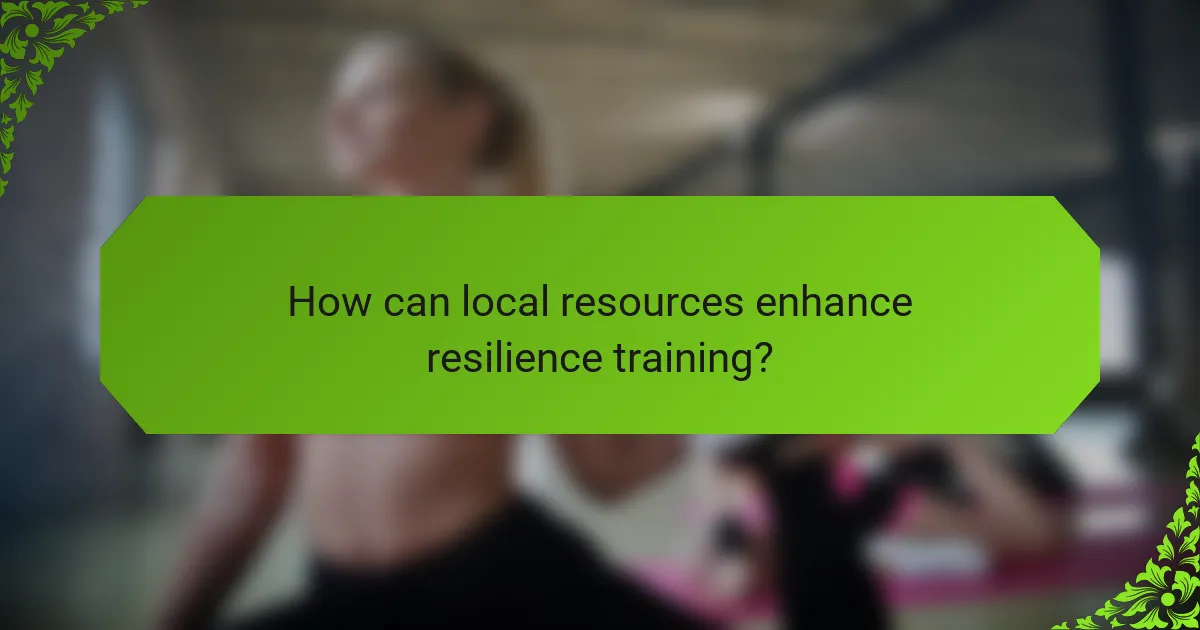
How can local resources enhance resilience training?
Local resources significantly enhance resilience training by providing tailored support and community engagement. Access to local coaches, facilities, and programs fosters a supportive environment for amateur athletes. Community workshops and training sessions create opportunities for athletes to learn resilience techniques in familiar settings. Additionally, local partnerships with schools and sports organizations can deliver specialized training that addresses specific challenges faced by athletes. This localized approach not only builds grit but also cultivates a sense of belonging and motivation among participants.
What community programs support resilience-building for athletes?
Community programs that support resilience-building for athletes focus on mental health, skill development, and peer support. These initiatives often include workshops, mentorship opportunities, and team-building exercises. Programs like Positive Coaching Alliance and the Athlete Assistance Program provide resources tailored to enhance grit and perseverance. As a result, athletes learn to navigate challenges effectively, fostering a growth mindset that is essential for success.
What are the best practices for integrating education into training?
Integrating education into training enhances athlete development by fostering resilience and grit. Key practices include establishing clear learning objectives, incorporating diverse teaching methods, and providing continuous feedback.
1. Set specific educational goals to align with training outcomes.
2. Utilize a mix of theoretical and practical approaches to engage different learning styles.
3. Encourage self-reflection to promote personal growth and accountability.
4. Implement mentorship programs to connect amateur athletes with experienced coaches.
5. Regularly assess progress to adapt training strategies effectively.
6. Foster a supportive environment that values education as part of athletic success.
How can workshops and seminars improve athlete grit?
Workshops and seminars enhance athlete grit by providing structured learning experiences that foster resilience. These events equip athletes with mental strategies to overcome challenges, build confidence, and develop a growth mindset. Research shows that participation in such programs can lead to improved performance and perseverance in sports. Engaging with experts and peers during these sessions creates a supportive environment, reinforcing the importance of grit in achieving long-term athletic success.
What role do mentors play in fostering resilience?
Mentors play a crucial role in fostering resilience by providing guidance, support, and encouragement. They help amateur athletes navigate challenges and setbacks, reinforcing the belief in their abilities. Mentors share their experiences, teaching athletes how to cope with adversity and develop grit. This relationship enhances emotional strength, enabling athletes to persist through difficulties.
What common mistakes should amateur athletes avoid in their resilience training?
Amateur athletes should avoid common mistakes in resilience training to enhance their performance. Key errors include neglecting proper recovery, setting unrealistic goals, and failing to track progress.
1. Neglecting recovery: Overtraining without adequate rest can lead to burnout and injury. Recovery is essential for building resilience.
2. Setting unrealistic goals: Aiming too high can result in frustration and decreased motivation. Focus on achievable targets to foster grit.
3. Ignoring mental training: Resilience isn’t just physical. Incorporate mental strategies to cope with setbacks and maintain focus.
4. Lack of consistency: Inconsistent training can hinder progress. Regular practice builds both physical and mental resilience.
What actionable tips can athletes implement to build grit?
To build grit, athletes can implement specific strategies such as setting clear goals, embracing challenges, maintaining a growth mindset, and developing a strong support system. These actionable tips foster resilience and enhance performance.
1. Set clear and achievable goals to maintain focus and motivation.
2. Embrace challenges as opportunities for growth and learning.
3. Cultivate a growth mindset by viewing failures as stepping stones to success.
4. Develop a strong support system with mentors and peers to encourage perseverance.
5. Practice consistency in training and routines to build mental toughness.
6. Reflect regularly on experiences to identify areas for improvement and celebrate progress.
